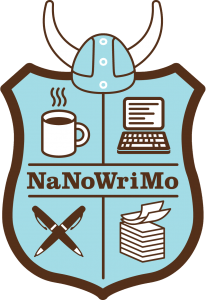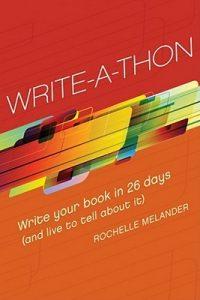Writers@Work: Use NaNoWriMo to Write Your Nonfiction Book
October 18, 2016

Image courtesy of National Novel Writing Month
Dear Writers,
Greetings!
It’s that time of year again! In less than two weeks, writers across the world will take the National Novel Writing Month challenge: write a 50,000-word book in a month.
During the next two weeks, the tips will help you prepare for the challenge. This week’s tip provides tools for you to prepare and write your nonfiction book during NaNoWriMo.
Happy Writing!
Rochelle,
The Write Now! Coach
Writers@Work: Use NaNoWriMo to Write Your Nonfiction Book
by Rochelle Melander
Last week at the opening class of the Write-a-Thon Book Coaching Program, I talked about the many benefits of writing a nonfiction book. It can:
+establish you as an expert
+increase your credibility
+educate and inspire the public about your work
+increase brand loyalty.
+create trust with your audience
+capture media attention
+build buzz for your business
+help you gain access to important people
+generate client leads
+And of course, generate income.
If you’re even thinking about using National Novel Writing Month to write your nonfiction book, here’s a quick start guide to planning your book:
Clarify your topic
Most of us have experienced that awful moment when someone asks about our book and we have no idea how to explain it quickly. We mutter, “Uh, the book’s about how you can, you know, be well better at doing stuff like …” Before we can get to the point, we’ve lost our audience. Yikes! Without clarity about our topic, we can’t talk about or write a book.
The solution: create a one-sentence topic statement. For Write-A-Thon, my sentence was: “Write-A-Thon teaches professionals how to plan and write books fast.” When I hit writer’s block, I’d return to my topic sentence. It helped me to regain focus and write forward.
Gather content
Now that you have a topic, what do you want to say about it? Most of us who plan to write books quickly will write about topics we know well—so well that we don’t even know everything we know. That’s why we need to take three distinct steps to gather our content:
+Do a brain dump. Record what you plan to write about your topic.
+Phone a friend—or two. Ask colleagues to list their top five questions about your topic.
+Talk to your market. Ask clients what information they’re interested in knowing.
By the time you’re done, you’ll have a great big list of stuff to write about.
Get structure
A book structure is nothing more than a container for your ideas. When you clean out a closet, you end up with stacks of stuff that need containers to hold them: shelves for shoes, drawers and rods for clothing, and bins for the extras.
Take a look at your stacks of ideas from your content dump and consider how you might best present this to a reader. Here’s an assignment I give my clients that will help you find the perfect structure:
Name your five favorite books and then check out their structures.
+How does the author tackle the topic?
+Does the book have sections?
+How many chapters are there?
+How long is each chapter?
+What kind of “pieces” does each chapter include—essay, callouts, sidebars, quotes, questions for discussion, and so forth.
Once you have a sense of what kind of book you like, make your own structure, plugging your ideas into the outline.
Gather research
So now you have lots to work with: a topic sentence, a list of ideas, and a structure to put them in. No doubt you can write much of this stuff without notes—it’s a part of who you are and what you do every day. But I’m guessing that some of your ideas will be boosted by additional information. Before November, gather that information in one place. Take these steps:
+Create a computer folder and move research documents or previous writing on your topic into it.
+Create a bookmarks folder for your book so that you can easily store and access helpful sites.
+Gather hard copies of books and other research notes in one place.
+Make use of online tools like Evernote to collect and organize research.
That’s it! Now you’re ready to tackle those small steps and write.
Pro Tip:
 If you want more detailed information on planning your nonfiction book, pick up a copy of my book, Write-A-Thon: Write Your Book in Twenty-Six Days (And Live to Tell About It).
If you want more detailed information on planning your nonfiction book, pick up a copy of my book, Write-A-Thon: Write Your Book in Twenty-Six Days (And Live to Tell About It).








